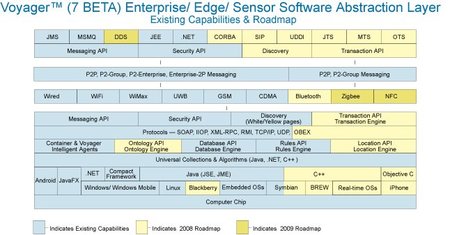Peer-to-peer mobile stack supports Android
Jun 26, 2008 — by Eric Brown — from the LinuxDevices Archive — 6 viewsRecursion Software is beta testing a cross-platform development environment for Java and Microsoft .NET developers building messaging and communications applications. The Voyager platform helps developers write a single code-set for mobile devices natively in either Java or .NET for “playback” on any supported platform, says Recursion.
The Voyager platform supports all Java editions, and more than 15 embedded operating systems, including Linux, says Recursion. Developers can publish the code to mobile or desktop nodes that will then execute transactions at runtime. Voyager avoids proprietary hardware requirements due to its decentralized peer-to-peer messaging, discovery, and edge processing, claims the company. Recursion sells a variety of C++, C#, and JGL development toolkits to government, military, and enterprise clients.

Voyager architecture
(Click to enlarge)
Each node on the Voyager network is both a client and server that publishes and subscribes to an ad hoc mobile community, says Recursion. Voyager is touted for its lightweight web services-based client code, which is said to process transactions and persistence locally, even without a network connection. As a result, says the company, single points of failure are reduced.
Each node can register and be discovered via a federated white and yellow page service, says the company, thereby enabling “micro commerce through location-based, dynamic, ad-hoc content delivery.” Prototype applications written for the platform so far are said to include cross-platform collaborative chat and “merchant-to-consumer intelligent shopping communities.”
Supported platforms include any JSE-compliant runtime, .NET CLR, and JME platforms including IBM's J9 and Aonix's PERC. Voyager is also said to support Embedded Linux, Windows Mobile, Windows CE, and VxWorks, offering specific support for the Linux-based Android spec.
Developers can write Voyager code in Java, C#, VB .NET, or C++. Newly added messaging capabilities bridge any Java Message Service (JMS) compliant service with Microsoft Message Queuing (MSMQ), says Recursion. The company claims that classes written in Java, C#, VB.NET, and Managed C++ can be turned into mobile agents without modification. Voyager is said to support a variety of web services technologies, including messaging protocols like SOAP, IIOP, RMI, and XML-RPC, as well as the umbrella framework, Service Oriented Architecture (SOA).
Stated Bob DeAnna, CTO of Recursion Software, “Voyager makes possible a new breed of killer apps sharing real-time, location-based information and participating in peer-to-peer collaboration, commerce and tasks.”
Availability
Developers can request a “private” developer beta of Voyager 6.2 for free download, here. The GA release for the final Voyager 7 is due in the third quarter. Planned enhancements include native support for JME CLDC/MIDP, Brew, and iPhone platforms.
www.recursionsw.com
This article was originally published on LinuxDevices.com and has been donated to the open source community by QuinStreet Inc. Please visit LinuxToday.com for up-to-date news and articles about Linux and open source.